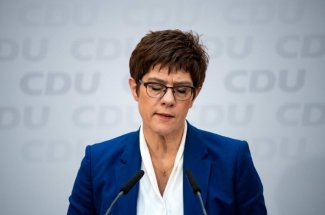Chaos on the German political scene: the CDU’s leader quits

Annegret Kramp-Karrenbauer, the leader of the CDU announced on 10 February that she would no longer lead the party and that she would not apply to run for chancellor as the Christian Democrat candidate during the election to the Bundestag in 2021. It may be concluded from what the CDU spokesperson said that Kramp-Karrenbauer will see the selection process of the next CDU candidate for chancellor to the end and will subsequently resign her office. Kramp-Karrenbauer believes that the CDU’s leader should be the party’s candidate for chancellor. Chancellor Angela Merkel expressed her hope that Kramp-Karrenbauer would continue to serve as the minister of Defence in her government.
Her resignation is a consequence of the political crisis provoked by the election of Thuringia’s minister president in the local parliament. On 5 February the CDU backed the FDP’s candidate, Thomas Kemmerich, in the third round of the election. This candidate was also supported by the AfD, thus guaranteeing that the representative of the Liberals would beat Bodo Ramelow from the Left Party, who had served as minister president in Thuringia until then. On Saturday, representatives of the grand coalition formed by the CDU/CSU and the SPD in Berlin insisted that a snap election should be held in Thuringia since they could not accept the candidate elected owing to the AfD’s support. However, the regional CDU is opposed to this solution. A poll conducted after the election of Kemmerich, who has already resigned from his position and who currently serves as acting minister president, revealed that support levels for Christian Democrats have dropped by 10 percentage points (to its present level of 12%). The developments in Thuringia led physical attacks against politicians from the FDP and their offices. Kemmerich is under police protection due to threats made against him. These attacks are motivated by accusations of co-operation with the AfD.
Commentary
- The fact that Kemmerich accepted his election for minister president of Thuringia, which was partly owing to support from the AfD, a party which has been excluded from any form of co-operation, has provoked violent reactions and chaos in German politics on local and federal levels. Kemmerich stepped down from the role due to criticism from representatives of all political parties (except for the AfD) and the media and due to pressure from hundreds of demonstrators who took to the streets of Berlin and Erfurt (and other cities). He will nevertheless continue to act in this capacity until a new minister president has been elected. The chairman of the FDP, Christian Lindner, was also criticised. In response to this, he asked the party leaders for a vote of confidence, which he won. The pressure has also caused Mike Mohring to announce that he will resign from his function of the CDU grouping leader in the landtag of Thuringia. The recent moves of the local CDU structures were in violation of the principle of refusing to co-operate with the AfD and the Left which the Christian Democrats had so far adhered to. The FDP had also ruled out co-operation with the AfD until recently, and one of Kemmerich’s key slogans during the election was to place himself in opposition to that party.
- The direct reason behind Kramp-Karrenbauer’s resignation was her inability to enforce the decision to hold a snap election in Thuringia and the conflict between the federal and local structures of the CDU. The local parliamentary election in October divided representatives of the CDU in Erfurt into those who tolerated the previous government led by Ramelow (for example, by supporting selected governmental projects) and those who wanted closer co-operation with the radical AfD. Both concepts were rejected by the federal board of the party who nevertheless failed to present any alternative. After the election of the new minister president of Thuringia, Kramp-Karrenbauer criticised the decision of the local CDU politicians and announced that it would be necessary to schedule a new election. The local party structures were opposed to this, and most of them wanted to support Ramelow, fearing a new election and a major drop in support levels.
- The position of Kramp-Karrenbauer as the leader of the CDU was visibly weakening since the Christian Democrats’ defeats in the election to the European Parliament last year and the elections to the landtags of Brandenburg and Thuringia last autumn. Regardless of her initial successes (for example, triggering a discussion on migration policy inside Christian Democrat circles), she did not manage to integrate the divided party. A significant section of party activists criticised her for failing to dissociate herself more decidedly from the policy which Chancellor Merkel has pursued and continuing to be open to the Green Party (for example, as regards climate policy). Kramp-Karrenbauer adopted this strategy because she wanted to prevent further flight of the electorate in two opposite directions: to the Green Party and to the AfD, which was visible during subsequent local elections in 2019. As her authority had been gradually undermined by party members, confidence in her was questioned during the party’s annual congress last November. Kramp-Karrenbauer came out on top back then.
- The choice between co-operating with the Left or the AfD will be increasingly challenging for the CDU. The fragmentation of the political scene makes it increasingly difficult to build a coalition against the AfD or the Left, especially in the east of the country. It will be increasingly common to see situations where three or four groupings will be needed to form a coalition to achieve a majority. The next occasion when the CDU will be tested will be offered by the elections in Saxony-Anhalt and Mecklenburg-Vorpommern next year, when it may turn out to be impossible to form a coalition without the AfD or the Left Party. This dilemma is coupled accusations levelled at the party leadership (where representatives of the western federal states are predominant) of failing to understand the special characteristics of the eastern federal states. The Christian Democrats in the eastern part of the country are more conservative and, out of fear that a major part of their electorate might be lost to the AfD, are more ready to co-operate with radical right groupings than with the Left Party, which is still viewed as a post-communist grouping.
- Kramp-Karrenbauer’s resignation will escalate the struggle for the leadership inside the party. Friedrich Merz is one of the key pretenders to the CDU leadership. Merz led the CDU Bundestag grouping in 2000–2002. He is a fierce opponent of Chancellor Merkel, and he only slightly lost out to Kramp-Karrenbauer in December 2018 during the struggle for the party leadership. Last week he announced he was giving up his business activity to become fully engaged in politics. His major competitors are: Armin Laschet, the minister president of North Rhine-Westphalia; and Jens Spahn, the minister of Health, who also sought election as party leader during the previous vote in 2018. Kramp-Karrenbauer’s unexpected resignation has also strengthened the position of the CSU’s chairman, Markus Söder, the minister president of Bavaria. So far, he has ruled out running for the chancellorship as a candidate of the CDU and the CSU (there have been only two Christian Democrat candidates originating from the CSU so far – Franz Josef Strauß and Edmund Stoiber – and neither of them was elected chancellor). However, given the increasing destabilisation, Söder’s significance in politics will grow. At present, the CSU is the only party in the government coalition to have a successfully regulated the issue of its leadership.
- The chaos inside the CDU and Kramp-Karrenbauer’s decision not to run for the chancellorship need to be viewed as a success of the AfD, and above all of its Thuringian leader, Björn Höcke. This will strengthen the party ahead of the possible snap election in Thuringia, where it recently achieved the second best result in Germany (23.4%), and will reinforce Höcke’s position during the power struggle inside his party. The leader of the Thuringian section of the AfD is a representative of the party’s radical wing, Der Flügel (it is being watched by the counter-intelligence services), and is taking power in the structures of the entire party to an increasing extent. The developments in Thuringia will also strengthen Höcke ahead of the party’s congress in Offenburg scheduled for late April.
- The election of a new CDU’s chairperson will affect Germany’s European policy and presidency of the Council of the EU. Preparations for holding an election and actually holding one entail a concentration on domestic politics. The crisis in Thuringia and the leadership change among the CDU offer an opportunity for the SPD to improve its rankings and launch a political offensive. The SPD have severely criticised the CDU and the FDP for the vote in Thuringia, condemning all forms of co-operation with the AfD. However, despite previous suggestions, the SPD’s leaders do not insist on scheduling a snap election to the Bundestag. This would be a risky move for the SPD, given its low support levels (14–15%) and the reorganisation inside the party’s central office that has been underway since Saskia Esken and Norbert Walter-Borjans became the party leaders last December.




